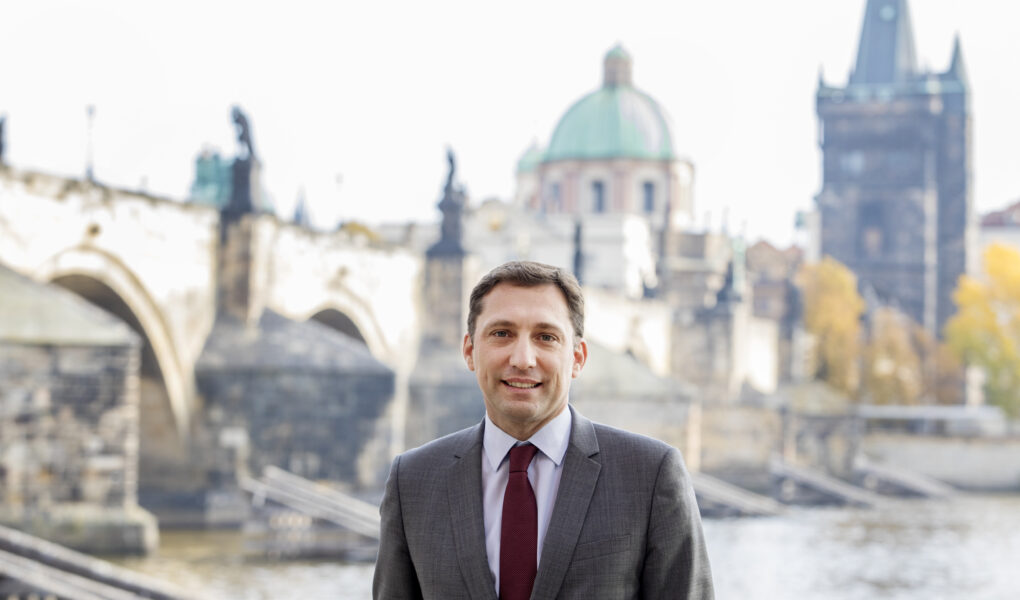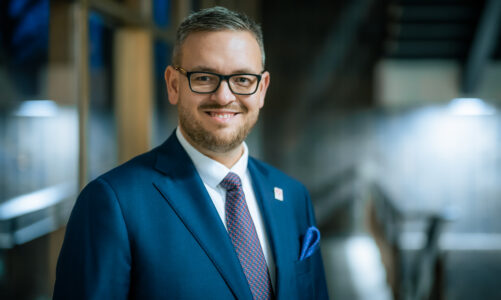H. E. Alexis Dutertre, Ambassador of France to the Czech Republic, first visited Prague in 1990, when he was 18 years old. His career as a diplomat has been infl uenced by the building of a reunified Europe and by the promotion of our interests in the field of common EU policies in Brussels. He has been Ambassador to the Czech Republic since 11 October 2020.
The first diplomatic relations between the two countries occurred in the Middle Ages. Today, both countries are members of NATO and the EU. What is the level of these relations today?
Emperor Charles IV, who studied at the Sorbonne, was the uncle of the French king Charles V (the Wise), with whom they were very close. And the Emperor’s visit to Paris, which remains famous thanks to a banquet held to celebrate the Epiphany in 1378, proves the antiquity of our ties, which were already close between Bohemia and France! France was the fi rst country to support the creation of the Czechoslovak army and subsequently the creation of the state itself, even before its foundation, in Darney in the Vosges department on 30 June 1918. On 9 December 1988, President Mitterrand met with Václav Havel and the Charter 77 dissidents at the French Embassy in Prague. This history of freedom binds us stronger together. However, these excellent relations are not static or merely based on memories; they are alive. Thanks to our joint participation in the EU internal market, our economic ties are profound: our bilateral trade exceeds EUR 12 billion. Around 500 French companies or their subsidiaries operate in the Czech Republic and employ more than 67,000 people. We have many joint projects emerging in the Czech Republic: in autonomous vehicles, in the defence industry, in high-speed rail networks, in water management, in heat networks, in the transition to a low-carbon economy, and in future technologies. We also have numerous university and cultural partnerships. Under the Erasmus programme, the Czech Republic attracts 1,800 French students every year! With six French Alliances françaises in Brno, Ostrava, Plzeň, České Budějovice, Pardubice and Liberec, as well as French bilingual sections in several Czech secondary schools, namely in Prague, Brno, but also in Tábor and Olomouc, Francophonie is omnipresent!
On the political level, our common membership of the European Union and NATO helps close dialogue on all topics that are crucial to our future. In 2022, France and subsequently the Czech Republic will hold the Presidency of the Council of the European Union. In this Franco-Czech year for Europe, we need to move forward with the European plan to make the European Union more assertive externally and closer to its citizens internally. France and the Czech Republic have many points in common: support for an energy transition policy that maintains the choice of nuclear energy as part of the solution to ensure our energy independence and achieve our climate goals; our countries have parallel programmes for the construction of new reactors; the protection of our external borders and the strengthening of Schengen; cyber security; the EU’s space programmes; or the protection of democracy and the rule of law. On foreign policy, we have immediately supported a united and massive EU response to Russia’s military aggression against Ukraine. We have strengthened our contribution within NATO to the security of our Allies in the Eastern flank. We come from diff erent perspectives and agree today on the need to specifi cally strengthen EU defence complementary to NATO, we are fi ghting together in the Sahel against terrorism, we support the stability and European prospects of the Western Balkans, and we share the same interest in a European strategy for the Indo-Pacific region. France and the Czech Republic always sit side by side in Brussels during the Council: the word “close” does not even begin to describe our relations!
This year is the year of the Czech and French presidencies of the Council of the EU. What are the French priorities for this period?
With his speech at the Sorbonne in 2017, the French President placed the European agenda at the centre of his activities. Through its priorities, France has developed an ambitious plan centred around the motto “recovery, strength, sense of belonging”. Let us summarise our actions in three priorities. First of all, a more sovereign Europe, in a world that is increasingly aggressive and where it is essential to be constantly reminded of our values and interests. This does not only concern security and defence, which are essential, but also other areas (technological, energy, digital, industrial, trade, borders and neighbourhood policy) where Europe should decide and act based on its interests, which it defines for itself and on behalf of itself. Secondly, a new European model for growth and investment, together with adapted budgetary rules which would make it possible to prioritise the investment needed to support transformations, particularly climate and digital transformations. And thirdly, a more humane Europe that sets rules to involve our fellow citizens better and be resolutely more democratic, which has respect for the rule of law and, in particular, freedom of the media.

of the National Day on 14 July 2021 with the Chairman of the Senate of the Czech Republic, Mr. Miloš Vystrčil
Trade relations between the countries are at a very high level. What are France’s preferred areas of cooperation?
French companies operate in the Czech Republic in all sectors of activity. We are of the opinion that the European legislative agenda, particularly that relating to the transition to a lowcarbon economy, provides a number of economic opportunities for businesses. Of course, our cooperation in the field of nuclear energy is an essential factor of convergence: France and the Czech Republic have worked side by side to advocate the inclusion of nuclear energy in the European taxonomy, and our two countries will run parallel programmes for the construction of new reactors in the coming years. However, French companies are also active and committed to the challenges in the areas of energy efficiency, energy performance of buildings, and — as regards clean mobility — autonomous and connected vehicles, high-speed rail projects and industrial cooperation in the area of hydrogen. We are also interested in supporting companies and start-ups that create specifi c outputs based on EU space programme services and data, which is also helped by the fact that the EU Space Programme Agency (EUSPA) is based in Prague. Thus, during our local Presidency, we will organise several French-Czech economic events at the Prague Embassy, focusing on hydrogen, energy efficiency in buildings and support for companies developing services based on EU space programmes.
French is the language of diplomats, but it is also the language of culture. What joint cultural projects are you preparing for?
The support and promotion of Francophonie are at the heart of our cultural activities in the Czech Republic, thanks to the work of the French Institute in Prague and the network of French Alliances (Alliances françaises). France was the guest of honour at the last edition of the Book World Prague. And this year, we will also welcome a number of renowned writers. Beyond the language, we will also offer many cultural events in the framework of the French Presidency of the Council of the European Union. For Europe Day, we are preparing a photography exhibition in the
park in Kampa. The Centre Georges Pompidou and the National Gallery Prague have established a partnership and will hold an exhibition in June. On the occasion of the opening of our Presidency, a concert was held at the Municipal House, where the Prague Philharmonia Orchestra played under the direction of the French conductor Emmanuel Villaume accompanied by the French pianist Michel Dalbert. We aim to establish lasting partnerships in the field of culture as well. In this way, by building on Mucha, who painted for major French brands, or Kundera, who settled in France, we can maintain the familiarity between our two cultures and the sense of European belonging.
Thank you for the interview.




